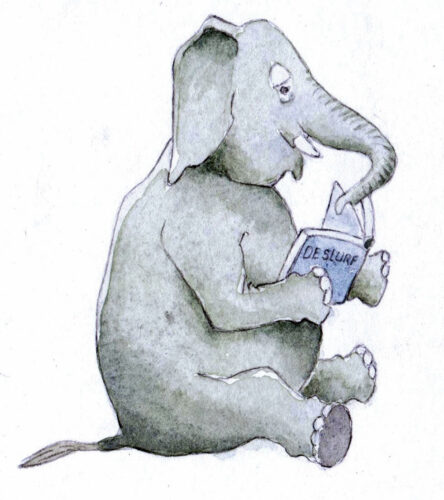A blog by Joyce Cordus
Once I met a man who was dying. Let’s call him John. He told about his life. He had had a good time. Had a wonderful family, a good job as a chemist. A life of prosperity and well-being. Until he became seriously ill and appeared to have no long life left. He looked for all kinds of ways to deal with this and ended up with Buddhism. For the first time in his life, John explained, he realized that life was more than just chemical processes. Among other things, he became aware that he had never said “I love you” to anyone before. Not even to his wife or children whom he loved dearly. For him, until then, love had never been anything but one of those chemical processes that so fascinated him. That insight also made him reflect on other relationships in his life. While looking back, memories came up of friendships that, for certain reasons, had come to an end. He realized now that that was still a burden he carried with him. They were situations in which he had indeed played a part although he did not remember exactly which one. He had done things that he now regretted and decided to look up all these people and talk about it as yet to put things right. In most cases, however, he said, people no longer knew what he was talking about. They had moved on with their lives and had probably thought: too bad, but sometimes things turn out differently than you expected. Sad sometimes, but not insurmountable. With that, the reason for the breakup between friends was also out of sight. They had let go of the incident. Perhaps not always consciously, but they did not carry the burden of that broken relationship with them. But John, so shortly before his death, did appear to suffer from it and felt the need to get it out of the way. And, so close to his death, he had the courage to do so. John’s story again reminded me of the story of two monks.
Two monks who were traveling arrived at a river. There they met a woman who wanted to cross the river. She was afraid of the current in the river and asked if the monks would help her across. The youngest monk hesitated. The elder, however, put her on his shoulders, waded through the river and set her down on the bank across the river. The woman thanked him and left.
The two monks traveled on. The elder quietly stepped through and enjoyed the beautiful scenery. The youngest was introverted. Something was bothering him. After walking for two hours, the youngest nevertheless broke the silence and said, “Brother, we were taught to avoid contact with women, but you carried her on your shoulders!”
“Brother,” replied the eldest monk, “True! I picked her up, carried her and set her down across the street, while you are still carrying her with you.”
 This story impressed me deeply when I first heard it. In fact, I was quite a worrier and “taking things for what they are” was not my strong suit. For me, then, both John’s story and the story of the two monks are about how we can continue to walk around with anger or resentment about “injustice done to us” or done to another. About how difficult but liberating it is to let go. For John, it was important to come clean before he died. That’s great and perhaps imaginable to a lot of people, but actually taking steps to actually do it doesn’t always prove easy. Not for nothing did John wait a long time to do that. In fact, to the point of no return. His story also touched me deeply at the time. That was perhaps the moment when I decided to delve more into forgiveness and forgiving and came to the realization that forgiveness is not about the other person, but about myself: about letting go of the burden I carry. Jack Kornfield, in his book “The Art of Forgiveness, Lovingkindness, and Peace” puts it this way, “Forgiveness does justice to the highest attribute of the heart. Whenever we stray, it brings us back to the foundation, which is love.” John’s story also made that clear to me: letting go and forgiveness are inextricably linked to love. I am still grateful to Jan for sharing his story so generously and lovingly at the time.
This story impressed me deeply when I first heard it. In fact, I was quite a worrier and “taking things for what they are” was not my strong suit. For me, then, both John’s story and the story of the two monks are about how we can continue to walk around with anger or resentment about “injustice done to us” or done to another. About how difficult but liberating it is to let go. For John, it was important to come clean before he died. That’s great and perhaps imaginable to a lot of people, but actually taking steps to actually do it doesn’t always prove easy. Not for nothing did John wait a long time to do that. In fact, to the point of no return. His story also touched me deeply at the time. That was perhaps the moment when I decided to delve more into forgiveness and forgiving and came to the realization that forgiveness is not about the other person, but about myself: about letting go of the burden I carry. Jack Kornfield, in his book “The Art of Forgiveness, Lovingkindness, and Peace” puts it this way, “Forgiveness does justice to the highest attribute of the heart. Whenever we stray, it brings us back to the foundation, which is love.” John’s story also made that clear to me: letting go and forgiveness are inextricably linked to love. I am still grateful to Jan for sharing his story so generously and lovingly at the time.
His story was an illustration of the story of the two monks. It made me realize all the more that continuing to carry anger, resentment or whatever negative feelings with you only leads to unnecessary suffering.
Should you want to learn how to let go and forgive, keep an eye on the calendar of this website, feel invited to join us – live or online!
– Joyce Cordus, April 2023

